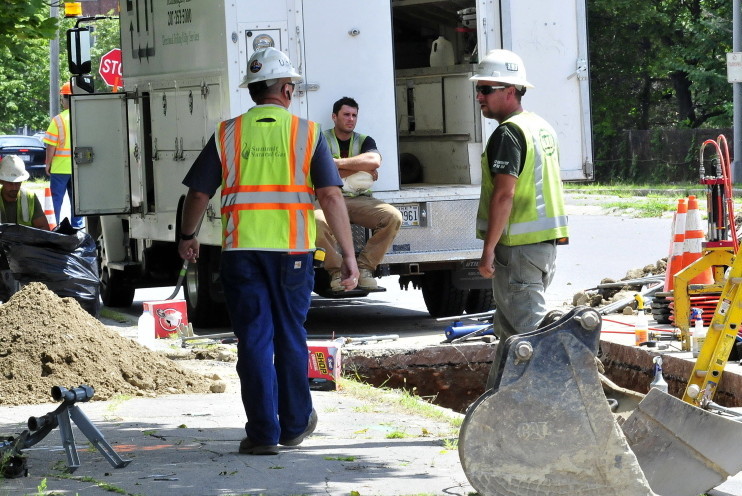Summit Natural Gas of Maine has scaled back its planned Kennebec valley build-out, citing a lack of demand because of low oil prices.
“The level of interest for new conversions isn’t as high as we thought or hoped it would be,” said Mike Duguay, Summit’s director of business development.
In May, the company laid out plans to expand its network of natural gas pipelines into areas of Augusta, Waterville and Fairfield. The expansion was part of an ambitious construction project to build a pipeline network from a 68-mile backbone pipeline stretching from Pittson to Madison.
But since the company laid out its expansion plans, the price of oil has plummeted.
According to NASDAQ, crude oil prices have tumbled from around $62 per barrel in mid-June to $41.71 per barrel on Thursday. As oil prices dropped, so did the price of heating oil, a common form of fuel in Maine households. According to the Governor’s Energy Office, the price of No. 2 heating oil last week was $2.17 per gallon, the lowest it has been since fall 2009 and down from a high of almost $4 a gallon in the winter of 2013-14.
Low oil prices mean potential customers aren’t interested in investing to convert oil boilers to natural gas, Duguay said.
While Summit is scaling back its expansion, its main competitor in Augusta, Maine Natural Gas, is moving ahead with its expansion this year, despite low oil prices.
“We made plans for 2015 and we’re sticking to everything we’re going to build,” said Pete Bottomley, manager of sales and marketing.
Maine Natural Gas is a subsidiary of Iberdrola, a Spanish energy company that also owns Central Maine Power Co. The company has been doing business in the state for 15 years and has seen price fluctuations before, Bottomley said. Even in times when natural gas is more expensive than oil, the company has grown its pipeline network, he added. The company plans long-term to be prepared to fill in residential lines when demand grows.
“Sometimes gas is higher than oil. Sometimes it’s a bargain,” Bottomley said. “When natural gas is much cheaper than oil, the phones won’t stop ringing.”
Summit’s 2015 build-out, which was focused mainly on residential areas, was always based on customer demand.
The planned expansion included 21,000 linear feet of 2-inch pipe in dense residential areas just off Main Street in Fairfield. The company estimated there are 1,940 residential customers and 140 commercial customers in the town.
In Augusta, it planned to build in residential neighborhoods on the east side of the Kennebec River and in Waterville along streets off Main Street.
But as the company went house by house by to get new customers earlier this year, it didn’t meet the level of interest needed to invest in new pipelines.
“Just right now, the numbers weren’t what we were hoping for. They just weren’t able to express a commitment to convert this year,” Duguay said. Duguay didn’t go into detail about precisely where Summit was postponing the build out or how much footage it was reducing from its plan.
On Wednesday, Fairfield Town Manager Josh Reny said Summit had contacted the town by telephone to tell officials it was cutting back its construction plans in town.
In an emailed statement Thursday, company spokeswoman Tammy Poissonnier said the company will construct about 85 percent of its planned build-out in Augusta, Fairfield and Waterville in Kennebec County; and Cumberland, Falmouth and Yarmouth in Cumberland County.
“Our goal is to prioritize our construction to service the communities where we are able to build and where there is the greatest demand,” she said.
Poissonnier didn’t outline exactly where Summit will cut back but said the company added 40,000 feet of natural gas main line to the 2015 build-out to serve communities that were not part of the original proposal but where there was customer demand.
The company believes that volatile energy markets means the price of oil will increase again, and it is still planning to complete construction on the network in future years.
“Clearly, we’re going through a period of time where there has been a monumental decrease in the price of oil,” Duguay said.
“It’s a unique situation brought on by global events,” he added.
The high upfront cost of converting from heating oil to natural gas or other more efficient systems has been challenge in Maine, particularly in some of the low-income parts of the state, such as the Kennebec valley, said Patrick Woodcock, the director of the governor’s energy office. The cost of converting to natural gas or another fuel runs anywhere from $3,000 to install a burner conversion on a modern system to $12,000 for a new system, Woodcock said.
While the dramatic drop in the price of oil means people might put off converting, they could use money they save on heating this year to invest in more efficient systems and become less dependent on heating oil.
“Lower oil prices are unequivocally a good thing, but we have to take advantage of that possibility to reduce our energy consumption and move forward with modern heat,” Woodcock said.
“The bottom line is we need to become less exposed to oil, and that means becoming more efficient,” he added. “I think Mainers are savvy. I think they understand that markets can change dramatically.”
Peter McGuire — 861-9239
Twitter: PeteL_McGuire
Send questions/comments to the editors.



